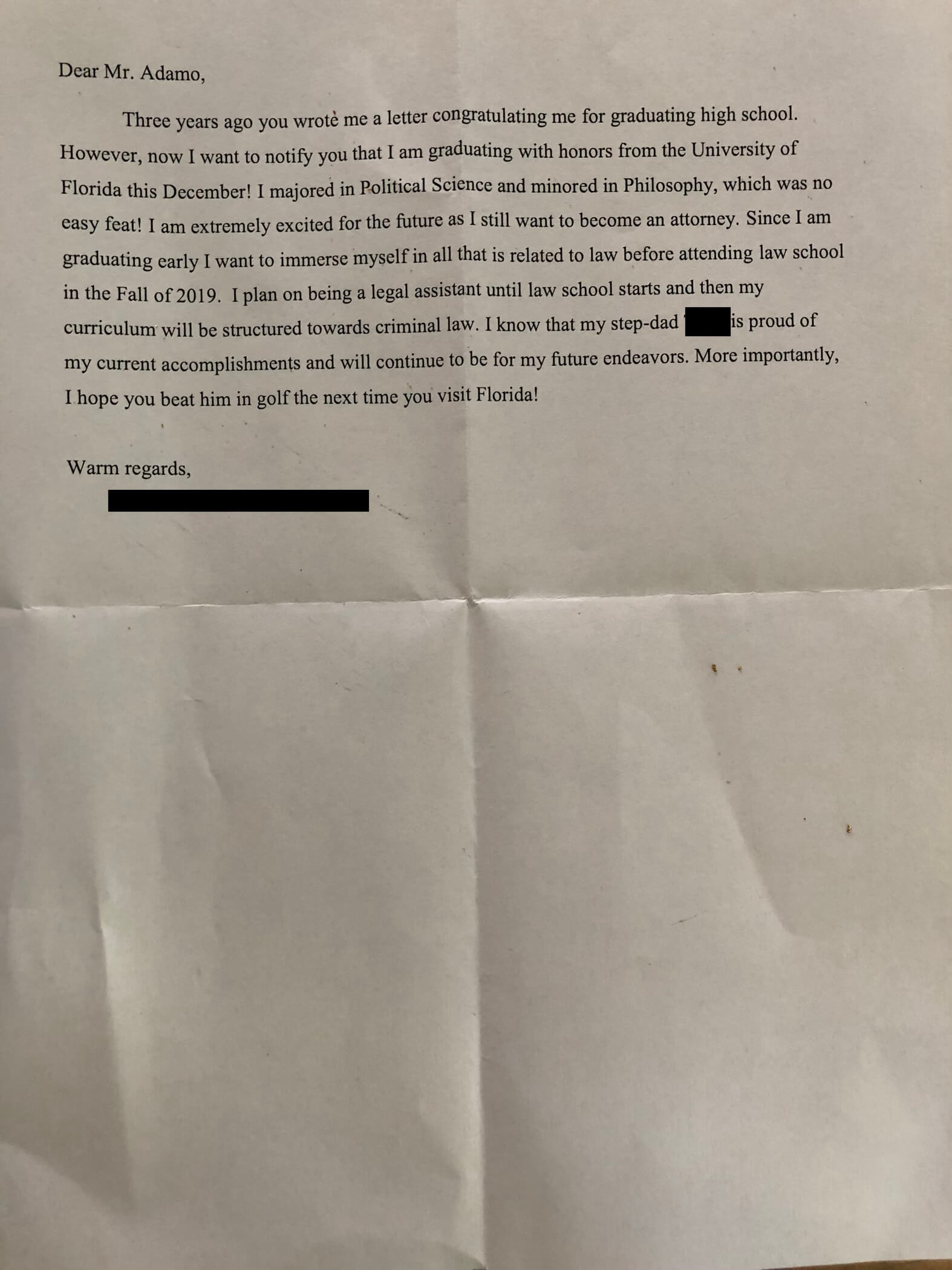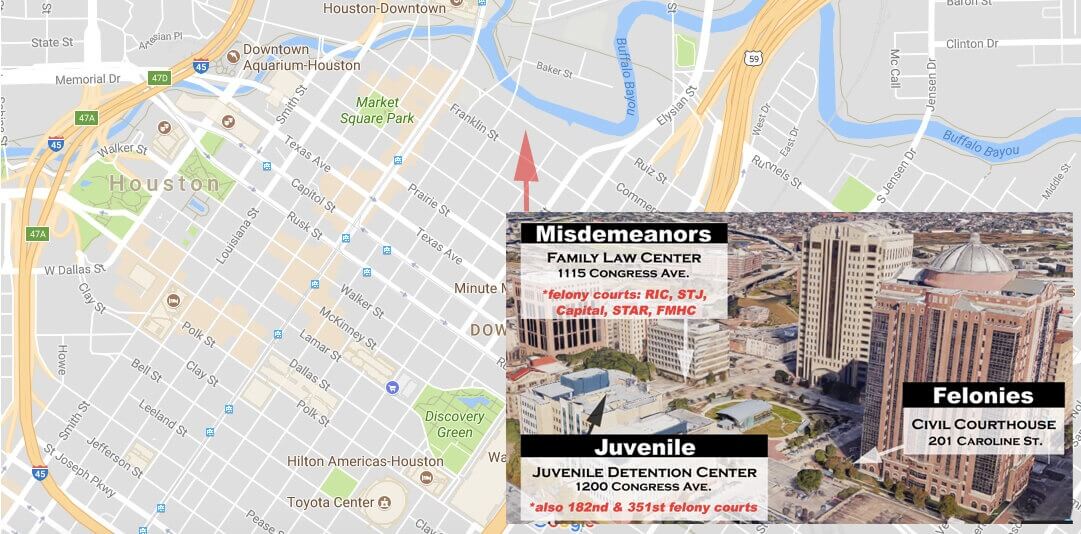Why We Do, What We Do – Adamo & Adamo Criminal Defense Law Firm
Why We Do, What We Do
This person came to us with her family after finding herself in a tough spot. A spot that seemed out of character for the type of person the girl was. Over time and with our guidance she was able to right the ship and now has plans to attend law school. True to character she wanted to thank and update us on her well deserved accomplishments. It is these relationships that act as the foundation of the Adamo & Adamo Law Firm and why we understand that we are more than just a law firm.
Harris County Criminal Courthouse After Hurricane Harvey
Life at the Harris County Criminal Courthouse Post-Harvey
Hurricane Harvey has come and gone, but its impact still looms.
The Harris County Criminal Courthouse no novice to flooding took its worst hit yet during Harvey. Not only were the ground floors flooded, but the sewage pipes burst causing a sh*t storm (literally) within the building walls. Time estimates have the artist formerly known as the HCJC out of commission for nearly a year (if not longer).
As such Houston’s criminal justice system is now spread around three courthouses: the Family Law Center (misdemeanor and specialty courts), the Civil Courthouse Building (felony courts), and the Juvenile Detention Building (juvenile and the 182nd and 351st Criminal District Courts). While all felony courts begin at 8:30 am sharp, the misdemeanor courts are staggered with both 8:30 and 12:30 dockets.
Harris County Criminal Courthouse Locations
Harris County Misdemeanor Courthouse Docket Times
8:30 Docket Call:
County Courts at Law No. 1, 3, 7, 9, 11, 14, 15, and 16
12:30 Docket Call:
County Courts at Law No. 2, 4, 5, 6, 8, 10, 12, and 13
*check your bond papers for the court and time.
Recognizing Evidence Tampering in Criminal Cases
 Criminal lawyers often receive evidence in the form of photographs, audio recordings, and video recordings.
Criminal lawyers often receive evidence in the form of photographs, audio recordings, and video recordings.
In order to be admissible in court the image or recording must be authentic. Today, easy-access to software allows even the unskilled computer user to create a new reality in minutes.
Image-audio-video tampering is the addition, removal, or relocation of content in a previously authentic recording. Contrasting resolutions within an image, audio interruptions, and additional video components (e.g. picture-in-picture) can call the evidentiary authenticity into question. Science permits different methods to review whether evidence has been tampered with.
Photo Response Non Uniformity (PRNU)
PRNU is the unique noise profile imprinted by a recording device onto the produced file. The PRNU can be extracted from the recording and compared with the devices known PRNU. Unmatched profiles can indicate the evidence has been altered.
Electric Network Frequency (ENF)
By measuring the underlying frequencies from a recording, ENF allows the analyst to determine where and when a recording was created. This assists in finding if the recording was created where and when it was purported to be.
File Name Extensions
File name extensions are unique to the equipment manufacturer and if an image or recording has been altered the new file name extension may reveal bad faith.
Metadata
Metadata (e.g. GPS coordinates) can reveal facts about the recorder’s model number, user settings, physical location, and more. These values can then be compared by the attorney’s known case facts. A useful tool for criminal defense.
Light Test
Light travels in a straight line, until an object throws off it’s intended path. For an image the light test involves drawing a straight line that touches upon an object and it’s corresponding point on the shadow. This is repeated for each point on all objects casting a visible shadow from the light source. All the lines should intersect at the same point. If any line does not intersect at the light source, then the object touching this line may have been added.
Ear Test
With audio recordings, incomplete words, sudden audio background changes, vocal fluctuations, pauses, clicking sounds and repeated phrases may all indicate edit points and tampering.
Eye Test
Is the resolution of an image or recording consistent with the recording device? Video-dvd’s created via post recording leave open the possibility of altercation. Also, the appearance of title screens, picture-in-picture (PIP), zooming and speed changes on a video can be proof of the video has been altered.
Error Level Analysis (ELA) and Video Error Analysis (VELA)
This test recompresses image and video files to identify affected areas. Postproduction changes will be disproportionally affected greater. The results can also identify which editing software was used.
The testing methods above provide reliable tactics if authenticity of an image-audio-video is at issue. Even if the evidence has not been altered, information obtained can provide powerful tools for a trial lawyer to use in defending the case.
One Shining Moment – Are NCAA Pools Illegal in Texas?
 Spring in Texas brings Southern California-like weather, crawfish, and March Madness. While collegiate athletes across the country fight for the ultimate prize, husbands, wives, employees, employers, and friends, fight for NCAA bracket bragging rights and often times cash prizes.
Spring in Texas brings Southern California-like weather, crawfish, and March Madness. While collegiate athletes across the country fight for the ultimate prize, husbands, wives, employees, employers, and friends, fight for NCAA bracket bragging rights and often times cash prizes.
But are NCAA pools illegal in Texas? Possibly.
The Texas gambling statute can be found in Texas Penal Code Section 47.02 which states, in part:
(a) A person commits an offense if he:
(1) Makes a bet on the partial or final result of a game or contest or on the performance of a participant in a game or contest;
(b) It is a defense to prosecution under this section that:
(1) the actor engaged in gambling in a private place;
(2) no person received any economic benefit other than personal winnings; AND
(3) except for the advantage of skill or luck, the risks of losing and the chances of winning were the same for all participants.
A NCAA pool seems to meet the elements of subsection (a)(1). However, subsection (b) does provide statutory relief if all three elements are met.
As to subsection (b)(2) it is unlikely any person is receiving or will receive any economic benefit, other than personal winnings. A “rake” is a percentage of the overall entry fees. If your buddy is taking a “rake” on the pool he organized then you need new friends.
In regard to subsection (b)(3), the excitement of March Madness is predicated upon the unknown. Hence the name, March Madness. In other words, the risks of losing and the chances of winning are the same for all participants.
Subsection (b)(1) is where the gray area lies. What is a “private place”?
Texas courts have held a poker room, tucked away in a public restaurant, surrounded by ropes and bouncers, was not a private place. However, an invite only e-mail, to a private online tournament room, could be considered a private place.
So if you received a private email to participate in a bracket pool you may have a valid defense in Texas.
Regardless, the odds of facing criminal charges for participating in a NCAA pool are slim. The odds of a jury actually convicting you are even more slim. In all likelihood the officers and jurors are NCAA pool participants as well. Such has become part of our culture.
The greater concern may be the estimated billions companies stand to lose for each unproductive work hour during the weeks of March Madness.
So while your office pool may technically be illegal, I wouldn’t lose sleep worrying if the police are going to break down your front door and haul you off.
Criminal Defense Attorney – Federal & State – Texas
Criminal Defense Trial Attorneys
Criminal Defense Trial Attorneys
Criminal Defense Trial To Watch:
Criminal Attorney – Recording the Police.
Criminal Attorney – Recording the Police, Dos and Don’ts.
Criminal Attorney – Do: Record.
In Texas you are legally allowed to record police encounters as long as you do not interfere with their work (a.k.a. interfering with public duties). Police may harass you, detain you, or try to intimidate you, but they can not arrest you for merely recording them. Recordings have exonerated many people, and often times is the only available, credible evidence.
Criminal Attorney – Don’t: Share your recording with the police.
You are not legally required to do so.
Criminal Attorney – Do: Respond politely, but firmly to police questions.
Officer: “What are you doing?” or “Stop recording, it’s against the law.”
Response: “Officer, I am exerting my 1st Amendment right to record?”
Texas, for example, is a one-party state. Meaning permission to record is only needed by one-party. You are that party.
Don’t Respond: “Making sure you are doing your job right?” or “I don’t trust you.
Criminal Attorney – Do: “Stand Back.”
If you’re approaching the scene of an investigation or an accident, police will likely order you to move back. While you do have a right to be there, you don’t want to interfere with police investigations. Keep an appropriate distance.
Criminal Attorney – Do: Understand when you have to show your I.D.
Officer: “Let me see your I.D.”
Response: “Officer, are you detaining me, or am I free to go?”
If you are being detained, I.D. yourself. If the officer does not have reasonable suspicion to believe you are involved in criminal activity, and is not detaining you, you do not have to show him identification. You can either leave or hold your ground. But…
Do: Know when to walk away.
Officer: “Shut it off or I’ll arrest you”.
At this point you are risking arrest in order to test the boundaries of free speech. If police say they’ll arrest you, believe them. It may not be a lawful arrest, but that hasn’t stopped police before.
If you keep recording, brace yourself for arrest. If you are arrested, don’t resist. As with any arrest, you have the right to remain silent until you speak with a criminal attorney. Contact your criminal attorney as soon as possible.
Do: Understand the 1st Amendment.
Officer’s may try and trick you into believing the 1st amendment -right to record – only applies to mainstream media journalist. It doesn’t.
As with many police encounters your attitude can make the difference in whether you will soon be required to post bond. Understand your rights and understand how to assert them.
Texas Criminal Defense – Police Warrants.
Texas Criminal Defense and Police at your Home:
There is no greater protection to police searches and seizures than in your home. Understanding how to exercise those protections is crucial to prevent unwanted and unnecessary intrusions.
The police are at my door, what should I do?
You have a few [good] options:
1) With the door remaining closed, ask “How can I help you ?”; or
2) Crack the door open and ask them “How can I help you?” through the door-lock opening; or
3) Don’t answer the door and they should eventually leave, unless they have a warrant.
The police may be there because they need assistance with a matter unrelated to you. Asking them “How can I help you?” will assist in learning the officer’s objective.
The police say they want to come into my house?
The short response is no. Not without a warrant. If the police say, “If you don’t let us in, we will go get a warrant”, then tell them go get a warrant. Until they show you a valid warrant, you shouldn’t allow them into your home.
The police are at my house with a warrant, do I have to let them in?
Yes. If you haven’t already, now would be a good time to call your Texas criminal defense attorneys.
Can officer’s lie to try and get information?
Yes. Legally, officers can and do lie to gain evidence. Many times officer’s do not have probable cause to arrest you. They ask questions, hoping you will gift wrap the probable cause they need. Knowing your rights will help prevent your words from getting twisted around and landing you in the back of a police car. Remember you have the right to remain silent. Request your Texas criminal defense lawyers. Be Firm.
What are some common things officer’s say to get information?
“Just cooperate with us and we will let you go.”
“If you tell us [what they want you to tell them], you will get out of here quicker.”
“We can ensure you get a good deal.”
“We have evidence that contradicts everything you just said.”
“That is not what [other person] said, tell us the truth.”
“What are you trying to hide?”
“You don’t need a lawyer, unless you are guilty.”
Can your roommate consent to a search of your home?
It depends on whether you are home or not.
If you are NOT home:
As a general rule, police can obtain consent to search from anyone with control over the property. If your roommate has a key or his name is on the lease he can give consent to a police search.
If you are home:
If your roommate consents to a search, you can object to the search and prevent the police from entering (unless they have a warrant). Simply state, “I do not give consent for you to search my home.” If the officer says he has a warrant, ask to see it. If the officer has a valid warrant, call your Texas criminal defense attorneys.
Can my landlord give consent?
Courts have held during a lawful tenancy a landlord cannot give officer’s consent to enter and search the tenant’s room.
What can I do to protect myself from a search of my room?
To maintain your expectation of privacy, keep your room locked, while maintaining control over your personal space. If your room is off-limits to roommates and friends, then it is off-limits to the police. If your room is the party room, then the police are going to treat it as such.
Texas Criminal Defense and Police at your Office:
The police are at my office, what should I do?
CALL YOUR TEXAS CRIMINAL DEFENSE ATTORNEYS.
With your Texas criminal defense lawyers on the phone ask them, “How you can help them?”
The police may be there because they need assistance with a matter unrelated to you. Asking them “How can I help you?” will assist in learning the officer’s objective.
But…
The police say they want to search my office?
The short response is no. Not without a warrant. If the police say, “If you don’t let us in, we will go get a warrant”, then tell them go get a warrant. Until they show you a valid warrant, you shouldn’t allow them into your office or allow them to search your office.
The police are at my office with a warrant, do I have to let them in?
Yes. If you haven’t already, it would be a good time to call your Texas criminal defense attorneys.
Texas Gun Laws – Open Carry
Effective Jan. 1, 2016
We will frequently update relevant laws and policies as they are interpreted and released (see below video).
Update 01/08/2016: Guns permitted in state owned psychiatric hospitals:
http://www.nydailynews.com/news/national/guns-permitted-texas-state-psychiatric-hospitals-article-1.2490274




